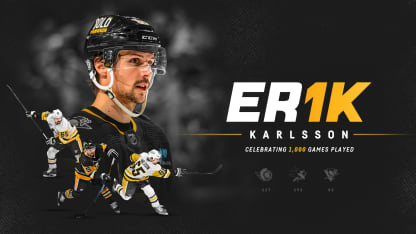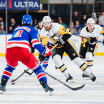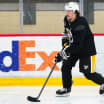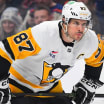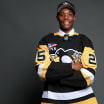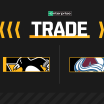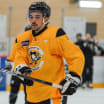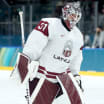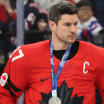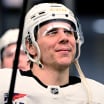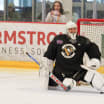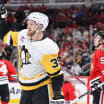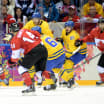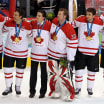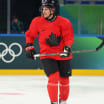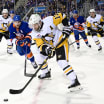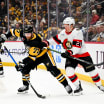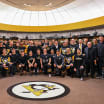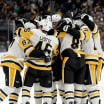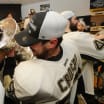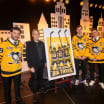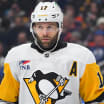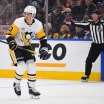Alfredsson had the honor of stepping up to the podium and making it official. Spezza, who was close with Murray, remembers how excited he was about the pick – “he’s like, ‘wait till you see this kid, he's dominant, he’s this and that, he’s the next great offensive defenseman, he was a steal in the draft’” – but took it with a grain of salt, as most GMs feel strongly about the kids they add into the organization.
That October, the Senators traveled overseas to play the Penguins in the first NHL game held in Sweden. With Alfredsson being from Gothenburg, which is home to Frolunda of the Swedish League, Ottawa played an exhibition game against the organization.
“Karl actually played for Frolunda then. So, I remember being like, oh, this is great. We're gonna play against this kid. It's gonna be really exciting, it'll be cool to see him,” Spezza said before adding with a laugh, “Then I saw him and I was like, he looks like he's the stick boy. I'm like, this is ridiculous! He looks like a 12-year-old boy, and this is the guy that we're all excited about?!
“When we got on the ice, he's trying to play, and we're men playing against young men. I'm thinking, this guy is gonna get killed. The puck drops, and he's got the puck all game. I’m like, okay, we might have something here!”
Karlsson, who is from the small town of Landsbro, spent the 2008-09 season with Frolunda before coming to training camp ahead of the 2009-10 campaign. He made the roster as a 19-year-old despite his size, which Karlsson estimates was around 5-8 and 155 pounds, while the league average was closer to 6-2 and 235 pounds. Ottawa’s D corps alone was anchored by the likes of Chris Phillips (6-3, 219 pounds) and Matt Carkner (6-5, 229 pounds).
“He’s been telling stories about when he first came into the league, how different it was, and how he was this tiny, scrawny guy and there were just a lot of big players, especially on their team,” Marcus Pettersson said with a laugh. “So, you can tell he carries himself a little different, and I guess he always has. He’s always been himself. That’s something that's high marks for him. He’s always been himself and stayed true to himself.”
While Spezza said Karlsson was fearless, never backing down from opponents who tried to run him over and playing through contact, “he knew, ‘I'm not gonna go in and show that I can win battles in the corner,’” Alfredsson said. “He knew that he had to do what he did best and try to do that, and stand out that way.”
Karlsson’s speed is what dazzled his veteran teammates Alfredsson and Spezza the most at that time. “He was faster than everyone. At that point, I had never played with anybody that skated as effortlessly as he did,” Spezza said.
“We heard how good he was offensively, a good skater, he was fast, but I never knew how fast,” Alfredsson said. “I've played with some fast players in the league before with (Marian) Hossa and (Martin) Havlat, but Erik was one of those players where you sit on the bench sometimes and you’re like, wow… he would do stuff I have never seen before.”
Like being a one-man breakout and beating a forecheck by himself, something Karlsson still does today.
“Sometimes, he would turn the puck over, but he knew he could get back anytime and break it up,” Alfredsson said. “So, he had a special ability and with his physical attributes, the speed and the hockey IQ as well, but I think his biggest asset is his mind and to believe, because I think everybody wanted him to play differently. He knew how to defend and when he had to, it would.”
Spezza said Karlsson changed how people looked at defensemen with his ability to be a second wave of offense. “Especially in his early days when we played together, it was funny – I didn't really worry as a player who I played with on a line. If I played with Karl, I felt like that was going to be the offensive element, so it allowed me to play with some more defensive-style guys,” he said.
“He just brought an element from the back end that was very different. There weren't too many point-a-game defensemen back then, and he was that. It was really cool as a teammate, just to kind of see him come onto the scene and the impact he made around the league.”
Karlsson is grateful for the role Alfredsson, the best man at his wedding, and Spezza, his friend and “my boss now!”, played in helping him thrive, saying, “I think that they probably protected me a lot more than I realized at the time. Looking back at it now, that's obviously something that I can see probably helped me stay my course for as long as I needed to turn into the player that they were hoping I would be.”
As Murray predicted, Karlsson did become the next great offensive defenseman. Last season in San Jose, where he played from 2018-23 after nine years with the Senators, he became the sixth defenseman in NHL history to reach 100 points in a season since Brian Leetch had 102 points with the New York Rangers in 1991-92.
He then became the ninth player in NHL history to win the Norris Trophy as the league’s top defenseman three times, joining Hockey Hall of Famers Bobby Orr (eight), Doug Harvey (seven), Nicklas Lidstrom (seven), Ray Bourque (five), Paul Coffey, Chris Chelios, Pierre Pilote and Denis Potvin (three each).
“Obviously he’s a game-changer, and every single time he has the puck, you know something special can happen,” Kris Letang said. “He puts every other team on their heels with his vision, the way he reads the play… he’s just been a tremendous player for a long time. To hit 1,000 and win three Norris, to score 100 points in one year is pretty impressive.”
Karlsson has accomplished what he has despite dealing with those aforementioned injuries, like tearing his Achilles in a game against the Penguins in February 2013. As Head Coach Mike Sullivan put it, it’s hard to play that many games in this league, and it takes a certain level of durability, competitiveness, and passion.
The entire time, “he’s continued to produce, and he’s done it consistently throughout the game changing,” Sidney Crosby said. “I think just his ability to create plays, I remember the first game we played against him – I think it was a preseason game – he threw a saucer pass from behind his net to the far blue line and it landed right on a guy’s tape. It was unreal. I just think that those kinds of plays just became something you got used to seeing from him right from the start.
“He got a lot of tough matchups too, especially early on in his career, and has continued to get that all the way through. So, he's been tested from the start until now, and continues to be an unbelievable player in this league.”

